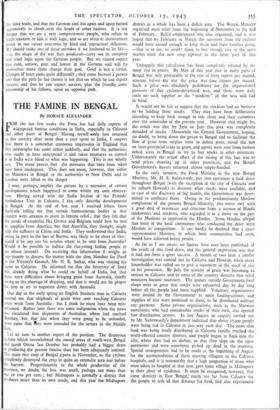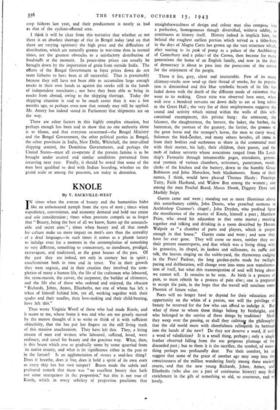THE FAMINE IN BENGAL
By HORACE ALEXANDER
FOR the last few weeks the Press has had daily reports of widespread famine conditions in India, especially in Calcutta and other parts of Bengal. Having myself .only just returned to this country after more than a year spent in India, I suspect that there is a somewhat erroneous impression in England that this catastrophe has come rather suddenly, and that the authorities who ought to have anticipated it and taken measures to control it in India were blind to what was happening. This is not wholly just. The event proves that the measures that have been taken have been inadequate. This does not. mean, however, that either the Ministers in Bengal or the authorities at New Delhi and in London were blind to the danger.
I may, perhaps, amplify the picture by a narrative of certain developments which happened to come within my own observa- tion. Having served whn the India Section or the Friends' Ambulance Unit in Calcutta, I can only describe developments in Bengal. At the end of last year I received letters from Auslralia telling me that certain humanitarian bodies in that country were anxious to assist in famine relief ; that they felt that the needs of countries like Greece and Belgium could best be met by supplies from America; but that Australia, they thought, might help the sufferers in China and India. They understood that India, owing in part to the loss of Burma, was likely to be short of rice : would it be any use for surplus wheat to be sent from Australia? Would it be possible to induce the rice-eating Indian people to eat wheat instead? On receiving this information I sought an oppf.Ttunity to discuss the matter with the then Member for Food in the Viceroy's Council, Mr. N. R. Sarkar, who was visiting his home in Calcutta. He informed me that the Secretary of State was already doing what he could on behalf of India, but that there were difficulties about bringing grain from Australia, chiefly owing to the shortage of shipping, and that it would not be proper for him to try to-negotiate direct with Australia.
One day in the early spring an English business man in Calcutta assured me that shiploads of grain were now reaching Calcutta every week from Australia : but I think he must have been mis- informed. Rather later there was some indignation when the news was circulated that shipments of Australian wheat had reached Bombay, but that just when they were going to be unloaded, news came that ltey were intended for the armies in the Middle East.
Let las turn to another aspect of the position. The disastrous cyclone which overwhelmed the coastal areas of south-west Bengal and north Orissa last October has probably had a bigger share in producing the present -famine than has been adequately realised. The main rice crop of Bengal ripens in November, so the cyclone completely destroyed the crop in quite an extensive area just before the harvest. Proportionately to the whole production of the Province, no doubt, the loss was small, perhaps not more than one or two per cent. ; but Midnapore is normally a district that produces more than its own needs, and this year the Midnapore
district as a whole has been a deficit area. The Bengal Ministry organised mass relief from the beginning of November to the end of February. Relief employment was also organised, and it was hoped that by February or March the survivors from the cyclone would have earned enough to keep them and their families going, —that is to say, to enabh them to buy enough rice in the open market until the- new crop ripened in the latter part of this year.
Unhappily this calculation has been completely vitiated by the steep rise in prices. By May of this year rice in many parts of Bengal was only procurable at the rate of forty rupees per maund, whereas before the war the price was four rupees per maund. Such a price was absolutely prohibitive for the impoverished peasants of this cyclone-devastated area, and there were daily raids on such supplies as the " stockists " of the area still had in hand.
It would not be fair. to suggest that the stockists had no business to be holding these stocks. They may have been deliberately intending to keep back enough to tide them and their customers over the remainder of the present year. However that might be, the result was that by June or July this area was completely denuded of stocks. Meanwhile the Central Government, hoping, no doubt, to bring down the prices in Bengal and to facilitate the flow of grain from surplus areas to deficit areas, raised the ban on inter-provincial trade. in grain, and agents were sent from various deficit areas in Bengal to try to buy stocks in other provinces. Unfortunately the actual effect of the raising of this ban was to send prices shooting up in other provinces, and the Bengal Government's buyers returned almost empty-handed.
In the early summer, the Food Minister in the new Bengal Ministry, Mr. H. S. Suhrawardy, put into operation a food drive throughout Bengal (with the exception of the city of Calcutta and its suburb Howrah) to discover what stocks were available, and in case of the discovery of big hoards, the Government was deter- mined to confiscate them. Owing to the predominantly Moslem complexion of the present Bengal Ministry, this move met with a good deal of resistance and criticism from a section of Hindu landowners and stockists, who regarded it as a move on the part of the Moslems to impoverish the Hindus. Some Hindus alleged that most of the local committees who conducted the drive were Moslem in composition. It can hardly be doubted that a more representative Ministry, in which both communities had sects, would have achieved better results.
As far as I am aware, no figures have ever been published of the result of this food drive, and the general impression was that it had not been a great success. A month or two later a similar investigation was carried out in Calcutta and Howrah, when every householder was called on to give a statement of the stock of rice in his possession. By July the scarcity of 'grain was becoming so serious in Calcutta and in some of the country districts that relief measures became necessary. The queues outside Government food shops were so great that stocks were exhausted day by day long before all the people had been supplied. Voluntary organisations were invited by the Government to open feeding-centres, and supplies of rice were promised to them, to be distributed without any payment. Some private organisations, such as the Marwari merchants, who had considerable stocks of their own, also opened free distribution centres. In late August an enquiry carried out by Mr. Suhrawardy's department indicated that about 17,000 people were being fed in Calcutta in this way each day. The news that food was being freely distributed in Calcutta rapidly reached the worst-affected country districts, and people began to flock into the city, where they had no shelter, so that they slept on the open pavements and were sometimes picked up dead in the morning. . Special arrangements had to be made at the beginning of August for the accommodation of these starving villagers in the Calcutta hospitals, and it is noteworthy that a high proportion of those who were taken to hospital at that time gave some village in Midnapore as their place of residence. It must be recognised, however, that some districts in East Bengal; much too far from Calcutta for the people to trek all that distance for food, had also experienced
crop failures last year, and their predicament is nearly as bad as that of the cyclone-affected area.
I think it will be clear from this narrative that whether or not there is an absolute shortage of rice in Bengal today (and on that there are varying opinions) the high price and the difficulties of distribution, which are naturally greater in war-time than in normal times, are the greatest obstacles to a satisfactory distribution of foodstuffs at the moment. In peace-time prices can usually be brought down by the importation of grain from outside India. The efforts of the Bengal Government to force prices down do not seem hitherto to have been at all successiul. That is presumably because they still have not been able to accumulate large enough stocks in their own hands as against the stocks still in the hands of independent merchants ; nor have they been able to bring in stocks from abroad, owing to the shipping shortage. Today the shipping situation is said to be much easier than it was a few months ago, so perhaps even now that remedy may still be applied. Mr. Amery has indeed stated in Parliament that shipments are on the way.
There are other factors in this highly complex situation, but perhaps enough has been said to show that no one authority alone is to blame, and that everyone concerned—the Bengal Ministry and the Bengal Government, the other political parties in Bengal, the other provinces in India, New Delhi, Whitehall, the inter-allied shipping control, the Dominion Governments, and perhaps the United States—must all co-operate if the present famine is to be brought under control and similar conditions prevented from recurring next year. Finally, it should be noted that some of the men best qualified to deal with Indian hoarding, whether on the grand scale or among the peasants, are today in detention.



























 Previous page
Previous page